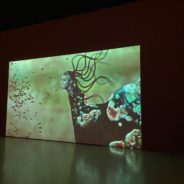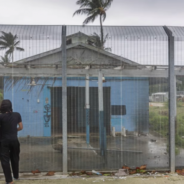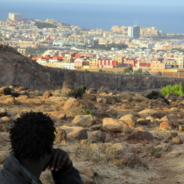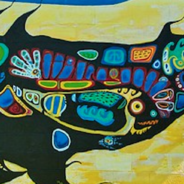If you would like to subscribe to receive our regular newsletter for all important events and updates, please complete the information below.
Image by Dan Alcade under a CC BY-NC-ND license.
Writing Across Worlds
Writing Across Worlds: In Converation with Victor Fernando R. Ocampo When: 28 April 2023, 12:00 — 13:20 Venue: Online Book your place Conversation with prolific Singapore-based Filipino writer Victor Fernando R. Ocampo, on his International Rubery Book Award shortlisted collection The Infinite Library and Other Stories, his influences and writing craft, and the state of speculative fiction in Southeast Asia today. Join us in conversation with prolific Singapore-based Filipino writer Victor Fernando R. Ocampo, on his International Rubery Book Award shortlisted collection The Infinite Library and Other Stories, his influences and writing craft, and the state of speculative fiction in Southeast Asia today. This discussion is hosted online and will be moderated by Malaysian editor and writer Zhui Ning Chang. Victor Fernando R. Ocampo is the author of the International Rubery Book Award shortlisted The Infinite Library and Other Stories (Math Paper Press, 2017; Gaudy Boy, 2021) and Here be Dragons (CANVAS Press, 2015), which won the Romeo Forbes Children’s Story Award in 2012. His writing has appeared in many publications including Apex Magazine, Daily Science Fiction, Future Fiction, Likhaan Journal, Strange Horizons, Philippines Graphic, Science Fiction World and The Quarterly Literature Review of Singapore, as well as anthologies like The Best New Singapore Short Stories, Fish Eats Lion: New Singaporean Speculative Fiction, LONTAR: The Journal of Southeast Asian Speculative Fiction, the Philippine Speculative Fiction series and Mapping New Stars: A Sourcebook on Philippine Speculative Fiction. He is a fellow of the Milford Science Fiction Writers’ Conference and a Jalan Besar writer-in-residence at Sing Lit Station (2020/2021). Zhui Ning Chang is a Malaysian editor, writer, and theatre practitioner based in London, UK. She serves as Fiction Editor at khōréō magazine, and is a co-editor on the Best of Malaysian Short Fiction in English 2010-2020 anthology. Her writing for performance includes queer romcom Seashore Yuanfen and time travel project Asian Pirate Musical; her essays and reviews have appeared in Strange Horizons, The BSFA Review, Library Journal, Fantasy/Animation, and more. Currently, she is a PhD researcher in transnational Southeast Asian speculative literature at Birkbeck, University of London. Featured image generated using...
read moreLeaves are Alive
When: 25 April 2023, 18:00 — 19:20 Venue: Birkbeck 43 Gordon Square Book your place Taking inspiration from Virginia Woolf's Mrs Dalloway, this interactive workshop considers our connection to trees. Taking inspiration from Virginia Woolf's Mrs Dalloway, this workshop considers our connection to trees. Sitting in Woolf's former home surrounded by Gordon Square's impressive plane trees, we will explore what kind of humanarboreal relations can be forged through literary, visual, audio-visual, and acoustic representation. We will handle small sections of the 4,800-year-old "Fenland bog oak" used to create a table for the Diamond Jubilee to inspire and prompt discussion. Come prepared to reflect on your own relationship with trees and help produce a collective creative piece by the end of the session. Mike Bintley is Senior Lecturer in Early Medieval Literature and Culture at Birkbeck. He wrote Trees in the Religions of Early Medieval England (2015), and co-edited Trees and Timber in the Anglo-Saxon World (2013) and the forthcoming collection The Surrounding Forest: Tree as Symbol and Metaphor at the Time of the European Middle Ages. He is currently working on an anthology of translations drawing together plant life and trees in the Old English poetic corpus, entitled Treow Forms: An Anthology of Trees and Plant Life in the Earliest English Poetry. Shani Cadwallender is a poet, teacher, Associate Tutor and part-time CHASE funded PhD student at Birkbeck. Her creative-critical doctoral project, 'Trees Revisited', considers ecological approaches to undisciplining Victorian Studies and the relationship between trees and poetry. She has been published by Dreich Press, Wildfire Words, Ink, Sweat and Tears, Nutmeg magazine and others. Caroline Edwards is Senior Lecturer in Modern and Contemporary Literature at Birkbeck, where she is Director of the Centre for Contemporary Literature. She is author of Utopia and the Contemporary British Novel (Cambridge University Press, 2019), co-editor of China Mieville: Critical Essays (Gylphi, 2015) and Maggie Gee: Critical Essays (Gylphi, 2015) and editor of The Cambridge Companion to British Utopian Literature and Culture, 1945-2020 (forthcoming). Caroline is currently writing her second monograph, Hopeful Inhumanism: The Elemental Aesthetics of Ecocatastrophe, which examines hopeful moments of inhuman collaboration within the elemental contexts of the lithic, the mycological, the arboreal, and the hydrological. Matt Mead is a furniture maker and writer, working at the intersections of craft, cultural history, and phenomenology. His writing has appeared in Cabinet, Hinterland, Photography and Culture and elsewhere. In 2010, he completed a PhD in Critical Theory at the University of Nottingham. He currently works at Jan Hendzel Studio, which focuses on producing expressive furniture from sustainable and reclaimed British timbers. He lives in London and can be found @other_objects. Featured image by Lex Melony on...
read moreThe Black Fantastic: Ekow Eshun in Conversation
with Ekow Eshun and Dr Caroline Edwards Friday 24th February 2023, 6-8pm, Keynes Library, 43 Gordon Square, Bloomsbury, London WC1H 0PD Please book your free ticket here. How are contemporary Black artists reimagining fantastic genres and motifs to address racism and social injustice? How do elements of folklore, science fiction, spiritual traditions, ceremonial pageantry and Afrofuturism inform multimedia Black art today? What can we learn from their powerful visions of futurity? We are thrilled to be joined by Ekow Eshun for a special session on the Black Fantastic. Eshun's recent exhibition "In the Black Fantastic," which ran from June to September 2022 at the Hayward Gallery, brought together contemporary artists from the African diaspora, whose work draws on science fiction, myth and Afrofuturism. Featuring artists such as Nick Cave, Sedrick Chisom, Ellen Gallagher, Wangechi Mutu, Chris Ofili, Lina Iris Viktor and Kara Walker, "In the Black Fantastic" was the UK’s first exhibition dedicated to the work of Black artists working in the realm of the fantastical – including mythology, folklore, spiritual traditions, science fiction and Afrofuturism – to explore racial injustices and identity. Eshun will reflect on his experiences curating this acclaimed exhibition and discuss how Black artists are exploring the fantastic across a variety of media. Ekow Eshun is a Ghanaian-British writer, editor and curator. He has been the editor of numerous magazines, including Tank, Arena and Mined. He was Artistic and Executive Director of the Institute of Contemporary Arts, London (2005-10), during which time visitors rose by 38%. He holds an honorary doctorate from London Metropolitan University and is Chairman of the Fourth Plinth Commissioning Group, overseeing London's most significant public art programme. He writes frequently for the Guardian, Independent on Sunday, The Face and the Observer. He is a regular contributor to BBC Radio 4 arts shows Saturday Review and Front Row. Eshun's Orwell Prize-nominated memoir, Black Gold of the Sun: Searching for Home in England and Africa (2005) explores issues of race and identity. In 2016, he curated a group exhibition at The Photographers’ Gallery, London exploring the identity of the black dandy, Made You Look: Dandyism and Black Masculinity. In 2017, he edited the publication Africa Modern: Creating the Contemporary Art of a Continent, which marked the opening of Cape Town’s Zeitz Museum of Contemporary Art Africa. He is also Chairman of Trafalgar Square’s Fourth Plinth Commissioning Group, and Creative Director of the arts space Calvert 22 Foundation, for which he has instigated an award-winning online magazine, The Calvert Journal. Please book your free ticket here. Venue information available here. Featured image: photograph of Wangechi Mutu's "The End of Eating Everything" (short film, 2013) taken by Dr Caroline Edwards at the "In the Black Fantastic" exhibition, Haywood Gallery London, September...
read moreSF & Extraction Conference CFP
SF & Extraction: LSFRC 6th annual conference 8-9 October 2022, Online Keynote speakers & Guest creators TBC. We're delighted to be supporting the 6th annual conference of the London Science Fiction Research Community, which returns in October 2022 as an international, two-day online event. Situating Extraction As Earth burns, capital continues to plunder more and more material with which to fuel its own destructive growth. ‘Extraction’ entails the removal – usually forcible – and conversion of the human and inhuman into marketable materials. In so doing, nature as such becomes implicated in human politics across a variety of tangled, exploitative confluences. Extraction is an imperialist, (neo)colonialist practice that has been wreaking havoc on life for over five hundred years, as resources and people are extracted from the Global South and profit accumulated in the Global North. It undergirds capitalism’s model of success-through-progress, occupying and controlling the horizons of past history, present conditions and future possibility. Extraction, then, insists that alternative ways of being-in-the-world do not matter, excluding, exploiting and destroying lives in order to keep the engines of eternal growth burning brightly. For the past two centuries, extraction has built a world petroculture, a global energy system that has caused disastrous damage to the planet’s climate and circumscribed social and cultural imaginaries. It is imperative that we find ways to conceive of futures free of extractive hegemony and the technofix solutions it proposes to the problems it causes. Sf builds new worlds, sometimes from the same components that constitute our present reality, sometimes with alternative ingredients and values toward more just and equitable ways of being. Its origins as a genre are colonialist and imperial, and its close affinity for the dominant technoculture remains ongoing. In spite of this – or, rather, precisely because of this – sf is uniquely effective as a mode of imagining capable of destabilising the binaristic divisions (nature/culture, first nature/second nature, centre/periphery) that underscore extractive thinking and practice. Sf has often been a genre of technical and personal mastery, but is increasingly a space for vulnerability, inclusion and change, of finding ways out of the historical nightmare that is being differentially forced upon us. The SF + Extraction Conference For our 2022 conference, the LSFRC welcomes submissions that explore the theme of Science Fiction + Extraction. We invite proposals for papers, panels, workshops, performances, and creative responses to the theme, and we would like to actively encourage alternative and innovative forms of presentation and engagement. It is our view that the theme of Extraction is urgent and at the same time broad and receptive to diverse interpretations. We welcome contributions that think with, through and about extraction in all its forms – as extraction of human and nonhuman subjects; appropriation of knowledge and indigenous practices; instrumentalisation of landscapes beneath, upon and beyond the Earth; parasitism; pollution as colonialism; the accumulative schematisation of linear temporal frames; forcefully extracted emotional labour; legacies of trauma and more – and its relationship with sf both as an extractive form of fiction and as a corrective/counter to extraction. From asteroid mining to dream harvesting, we want to engage with sf texts and ways of thinking across all media that explores, unravels and seeks to push beyond extraction’s mastery of the past, present and future. Please email proposals (300...
read moreMigration & Documentality
Migration & Documentality: Collaborative Thinking and Social Justice A collaborative and interactive panel talk on issues of contemporary migration, documentality and social justice. Wed, 22 Jun 2022, 20:00 BST (free event, booking required) Goodenough College, Mecklenburgh Square, London WC1N 2AB This panel discussion features Dr Henghameh Saroukhani (Saint Mary’s University, Canada) and Dr Agnes Woolley (Birkbeck, University of London) who will be discussing their current collaborative work on migrant life, documentality and genre-bending writing. Their conversation will examine the radical journalistic prose of the Iranian-Kurdish writer Behrouz Boochani who wrote about his imprisonment on Manus Island entirely on WhatsApp alongside the neglected archival material required to fully understand the morbid injustices associated with the recent Windrush scandal. They will discuss the nature of collaborative thinking, embodied research practices and the ethics of writing about illegalized and 'undocumented' lives. This talk encourages feedback and sharing from audience members so as to facilitate a space of intellectual affinity, solidarity and alliance. Supported by the Birkbeck Institute of the Humanities, the Centre for Research on Race & Law (Birkbeck), and The Decolonial Group (GoodEnough). Contact information: henghameh.saroukhani@smu.ca and/or a.woolley@bbk.co.uk. Click here to book your free place at this event. Featured image from Chauka, Please Tell Us the Time (Dir. Behrouz Boochani,...
read moreFuturisms in Contemporary Turkey
4 July 2022, 6pm, The Keynes Library, 43 Gordon Square, Bloomsbury, London, WC1H 0PN Attendance is free, but booking is required. This talk will introduce scholarship on speculative fiction and futuristic narratives in Turkey and give a historical and literary survey of the tradition of entangled futurities and speculative worldbuilding in contemporary Turkish Literature. Discussion of the selected primary texts will illustrate the intellectual and academic interest in contemporary Turkey and the common concerns and themes portrayed in Turkish literature. Dr Emrah Atasoy is the author of the monograph Epistemological Warfare and Hope in Critical Dystopia (2021) and several articles and book chapters on speculative fiction, futuristic narratives, Turkish speculative fiction, ecocriticism, twentieth-century literature, and comparative literature. He is currently a visiting postdoctoral scholar at the Faculty of English, University of Oxford, as a recipient of the TUBITAK (The Scientific and Technological Research Council of Turkey) 2019 International Postdoctoral Research Fellowship Grant. Please click here to book your place. Featured image taken by Emrah Atasoy....
read moreThe Progressive Fantastic in Germany
Changing the Voices of Science Fiction: The Progressive Fantastic in Germany Wednesday 22 June 2022, 6-7.30pm, Birkbeck, University of London (attendance is free, but booking required) German science fiction has traditionally been a conservative genre, its main authors to this day mostly white, cis, hetero males of middle age. Until recently, diversity of genders, non-heteronormative sexuality, race or varied ethnic and cultural backgrounds, or representations of other marginalized groups (age, (dis)ability, etc.) has been sorely missing. But there has been a concerted effort by a younger, more diverse group of writers to change the approach to fantastic literature as a whole. Under the umbrella of the "progressive fantastic," they have called for the inclusion of other identities in speculative fiction, the strengthening of own-voices, and a keen-eyed reexamination of traditions and structures in fantastic texts. In this talk, I want to present the key features of this "progressive fantastic" by looking at exemplary texts of recent German SF production: Judith and Christian Vogts groundbreaking work in writing in a non-heteronormative language and presenting intersectionally diverse communities in Wasteland (2019) and Ace in Space (2020); James Sullivan’s investigation of belonging and self-positioning via Afrofuturist estrangement in Die Stadt der Symbionten (2019), Lena Richter’s subtle emphasis on (dis)abled and neurodivergent characters in her short stories "Feuer" (2020) and "3,78 Lifepoints" (2021), and Theresa Hannig’s reinvigoration of the hopeful narrative strategies of utopia as a genre in Pantopia (2022). Dr Lars Schmeink is currently Leverhulme Professor of German Studies at the University of Leeds, visiting from his position as Research Fellow at the Europa-Universität Flensburg, where he just applied for funding for a larger research project on science fiction as a form of science communication. Before coming to Leeds, he concluded his work as principal investigator of the federally funded "Science Fiction" subproject for the "FutureWork" network, an interdisciplinary research group working on the development of work and society. In 2010, he inaugurated the first German academic organization dealing with research into the fantastic, the Gesellschaft für Fantastikforschung, and served as its president for ten years. He is the author of Biopunk Dystopias (2016), and the co-editor of Cyberpunk and Visual Culture (2018), The Routledge Companion to Cyberpunk Culture (2020), Fifty Key Figures in Cyberpunk Culture (2022) and New Perspectives on Contemporary German Science Fiction (2022). Click here to book your free place. CLICK HERE TO LISTEN TO A RECORDING OF THE LECTURE. Featured image by BroneArtUlm under a CC BY...
read moreWriters Rebel on hope and climate activism
Thursday 19 May 2022, 7.30pm, 43 Gordon Square Join us for this special event as part of Birkbeck Arts Week 2022 (free to attend, booking required). Writers Rebel was formed in late 2019 by a group of writers who felt they could no longer ignore the Climate and Ecological Emergency, but had to make it central to their writing and their political lives. Writers Rebel, as part of Extinction Rebellion, has since then drawn national attention to the climate disinformation spread by lobbyists based on Tufton Street. Many fellow authors, including Zadie Smith, Ben Okri and Margaret Atwood, have joined the campaign. For this event, Birkbeck welcomes three of these writers – Chloe Aridjis, Monique Roffey and Toby Litt – to talk about writing, hope, activism and climate. Monique Roffey is an award winning Trinidadian born British writer of novels, essays, literary journalism and a memoir. Her most recent novel, The Mermaid of Black Conch, (Peepal Tree Press) won the Costa Book of the Year Award, 2020, and was nominated for eight major awards. The film rights were sold to Dorothy Street Pictures and will be developed by Film Four. Her other Caribbean novels, The White Woman on the Green Bicycle and House of Ashes, have been nominated for major awards too (Costa, Orange, Encore etc). Archipelago won the OCM Bocas Award for Caribbean Literature in 2013. Her work has been translated into several languages. She is a co-founder of Writers Rebel within Extinction Rebellion. She is a Senior Lecturer at Manchester Metropolitan University and a tutor for the National Writers Centre. Chloe Aridjis is the author of three novels, Book of Clouds, which won the Prix du Premier Roman Etranger in France, Asunder, set in London's National Gallery, and Sea Monsters, which was awarded the 2020 PEN/Faulkner Award for Fiction. Chloe has written for various art journals and was guest curator of the Leonora Carrington exhibition at Tate Liverpool. She was awarded a Guggenheim Fellowship in 2014 and the Eccles Centre & Hay Festival Writers Award for 2020. Chloe is a member of Writers Rebel, a group of writers who focus on addressing the climate emergency and biodiversity loss. A collection of her essays and short fiction, Dialogue with a Somnambulist: Stories, Essays and a Portrait Gallery, was published last autumn. Toby Litt has published novels, short story collections and comics. His most recent book is Patience, a novel. He runs the Creative Writing MFA at Birkbeck College, and blogs at www.tobylitt.com. He is a member of English Pen and the editor of the Writers Rebel website. He is currently publishing his next book, A Writer’s Diary, in daily entries on Substack. When he is not writing, he likes sitting doing nothing. Click here to book your free place. Featured image by by Markus Spiske on...
read moreRefugee-Led Filmmaking
"Fifth Cinema": Theorising Refugee-Led Filmmaking, with Raminder Kaur and Mariagiulia Grassilli When: 15 October 2021, 18:00 — 21:00 BST Venue: Online (please book your place here) CCL member Dr Agnes Woolley will be hosting a screening of Les Sauteurs [Those Who Jump] (2016), directed by Abou Bakar Sidibé, Moritz Siebert and Estephan Wagner, followed by discussion with Raminder Kaur and Mariagiulia Grassilli on 15 October 2021. Raminder Kaur and Mariagiulia Gassilli describe ‘Fifth Cinema’ as: ‘a mobile, unstable, instantaneous, fragmented, displaced and hybrid bricolage. A “smart cinema”, owing to the prevalence of digital technologies, it exists in dispersed pockets. It is the expression of new creative modes’. In this discussion, we will unpack the idea of Fifth Cinema in relation to recent refugee filmmaking, asking what conceptual frames help us think through image making in the context of statelessness. We will explore the production contexts for these films and consider their role in resisting punitive bordering practices. Raminder Kaur is professor of Anthropology and Cultural Studies in the School of Global Studies at the University of Sussex. She is the author of Kudankulam: The Story of an Indo-Russian Nuclear Power Plant (2020); Atomic Mumbai: Living with the Radiance of a Thousand Suns (2013); and Performative Politics and the Cultures of Hinduism (2003/5). She is also co-author of Adventure Comics and Youth Cultures in India (with Saif Eqbal, 2018), Diaspora and Hybridity (with Virinder Kalra and John Hutnyk, 2005); and co-editor of several other books. Aside from her academic writing, she is a scriptwriter, theatre producer and filmmaker. Mariagiulia Grassilli is Research Associate at the School of Global Studies, University of Sussex and Director of Human Rights Nights in Italy. She works as a professional in Cinema and Human Rights, curating festivals and film production for raising awareness, creating empowerment and capacity building in Europe and Africa. Founding member of Human Rights Film Network – an international network of more than 40 human rights festival in the world. Her research focuses on migration, cinema, representations of diversity, cultural participation. Her publications include writings on Anthropology and Cinema (Journal of Visual Anthropology, vol. 20, 2007), Migrant Cinema (Journal of Ethnic and Migration Studies, vol. 34, 2009) and Human Rights Film Festivals (Film Festival Yearbook 4, St Andrews University, 2012). This is an online event: the link to the live discussion will be sent out on the day, and the film – Les Sauteurs (Abou Bakar Sidibé, Moritz Siebert and Estephan Wagner, 2016) – will be made available on the BIMI Screening Room for 24 hours before the event. Please book your place...
read moreIndigenous Futurisms Keynote
We were really thrilled to be able to host "Activism & Resistance," the 5th annual conference of the London Science Fiction Research Community (LSFRC), which ran from 9-11 September 2021. Prof. Grace Dillon (Portland State University) delivered a wonderful keynote on the subject of “Moozhig-aendum-itchigaewin: Indigenous Futurisms and Climate Justice.” You can watch Grace's inspiring keynote below, which was chaired by Birkbeck's very own Dr Katie Stone (Research Associate, Department of English, Theatre & Creative Writing, Birkbeck). The talk considers how indigenous science fictions can help us decolonise the geological period known as the Anthropocene, by drawing on a rich set of indigenous practices that advocate dignity and humility in not giving up in the face of more than 500 years of colonial violence. Speaker bios: Grace L. Dillon is an American academic and author. She is an Anishinaabe Professor in the Indigenous Nations Studies Program, in the School of Gender, Race, and Nations, at Portland State University. Similar to the concept of Afrofuturism, Dillon is best known for coining the term Indigenous Futurism, which is a movement consisting of art, literature and other forms of media which express Indigenous perspectives of the past, present and future in the context of science fiction and related sub-genres. Dillon is the editor of Walking the Clouds: An Anthology of Indigenous Science Fiction, which is the first anthology of Indigenous science fiction short stories, published by the University of Arizona Press in 2012. The anthology includes works from Gerald Vizenor, Leslie Marmon Silko, Sherman Alexie, William Sanders and Stephen Graham Jones. Previously, Dillon has edited Hive of Dreams: Contemporary Science Fiction from the Pacific Northwest, which was published in 2003 by Oregon State University Press. Dr Katie Stone is Research Associate in the School of Arts at Birkbeck, University of London. Katie's PhD, titled "Children are the Future: Utopianism and Childhood in Science Fiction and its Criticism," was successfully completed in Spring 2021. Her most recent publication, "Hungry for Utopia: An Antiwork Reading of Bram Stoker's Dracula," was published in the journal Utopian Studies in 2021. Image by Ted McGrath under a CC BY-NC-SA...
read more










Recent Comments